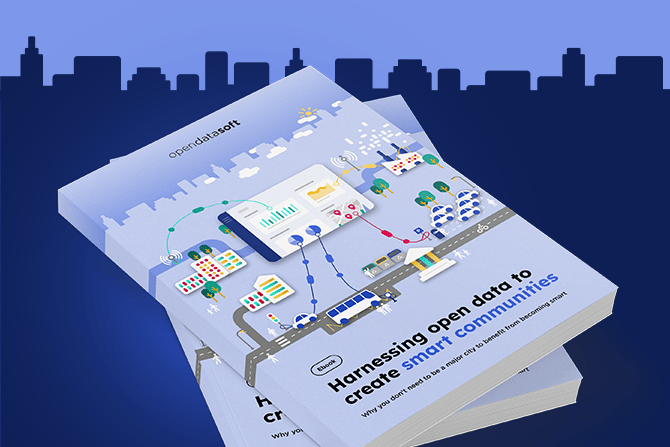How data portals help cities and municipalities manage risk and drive transparency
In today’s digital-first world, data sharing and use is essential to effective local government operations. Based on our recent webinar, Opendatasoft customers the City of Kingston and the Town of Cary explain how data portals are helping them to deliver on the needs of their citizens and employees.

Successful city and municipal governments are focused on achieving multiple objectives. They need to deliver on the changing needs of citizens and businesses, and increase efficiency and transparency while understanding and better managing risk.
Data portals are key to enabling them to meet all of their goals, helping share data externally with the community and internally with employees to build a data-centric organization. But how do you start your data portal journey and how can you create the data culture required to encourage and drive forward data sharing?
To find out, we brought together the City of Kingston in Canada and the Town of Cary in North Carolina. During an in-depth webinar they highlighted how they are using data portals to deliver on the changing requirements of their citizens and other stakeholders. In this blog we’ll focus on four central questions discussed with Jess Rogers of Kingston and Gregory Power of Cary, during the webinar, illustrated with their experiences.
What were your challenges and how did a data portal help overcome them?
Cary
With a population of 180,000 Cary is the second largest municipality in Wake County, North Carolina, behind the state capital Raleigh. Nationally recognized as a great place to live and as a smart city pioneer it generates large volumes of data. The challenge, as Gregory Power points out, is to share this data in ways that it can be used easily by its audiences, which led to the creation of its Opendatasoft-based open data portal in 2016 to provide a central place to share, sort and visualize data.
Kingston
Located on Lake Ontario, Kingston is home to 120,000 people. Its data sharing program was driven by two factors. Firstly, it was legally mandated to share certain data with its community, which it was aiming to do as efficiently and engagingly as possible. At the same time the council understood the need to become more transparent around its performance, activities and decision-making. A data portal was the obvious choice to meet these requirements. “Our view is that this data is owned by the people of Kingston, and we want to share it as quickly and easily as possible,” explains Jess Rogers.
How does your data portal help you reduce risk?
Cary
Much of Cary’s data on its portal is focused on better managing risk – whether environmental or personal, such as highlighting accident blackspots on the town’s roads.
On the environmental side, Cary is prone to flooding due to stormwater surges. To provide an early warning system and to predict flooding it has installed a network of Internet of Things (IoT) water sensors and rain gauges across the town. This data is shared through an interactive, granular dashboard on its data portal, keeping the community up to date on flood risks. Importantly this data is also used for internal decision-making, including the closure of roads or greenways, rerouting traffic to avoid floodwaters, and collaborating with communities upstream and downstream to assist in their preparedness efforts.
Kingston
Kingston began its open data program with data designed to meet specific needs within the community. Its Fire and Rescue dashboard demonstrates the Fire Department’s ongoing performance, sharing key metrics including average response times, average incident duration, locations, and the number of units dispatched. It also highlights a vital success factor in data sharing. “We learnt very early that when people say they want data, they are actually looking for information and insights, rather than downloading an Excel spreadsheet,” outlines Jess Rogers.”Our aim is to provide them with answers to their questions efficiently and transparently, so they don’t need to make contact to get information.”
What new services and innovations is your data portal helping you introduce?
Cary
As part of its commitment to innovation, Cary worked with the North Carolina Department of Transportation (NCDOT) on a trial of its CASSI autonomous shuttle in one of its larger parks. All the data from the 12 week pilot was shared via the data portal, with regular updates providing information on metrics such as ridership, number of journeys, and shuttle performance.This gave invaluable insights into areas for improvement and highlighted how rider perceptions around safety changed positively once they’d experienced CASSI. As well as demonstrating total transparency, all of this data has been used to shape the next phase of the program. Gregory Power adds, “What impressed NCDOT was that we were able to provide updates on the performance of the pilot every week in a way that was transparent, easy to access, and easy to understand–which was something that hadn’t been done before in this program.”
Kingston
Continuing the theme of innovation, Kingston has launched its MyKingston app, designed to provide a one-stop shop for the community by enabling people to interact digitally with the city. Fed by information from its data portal, the app brings together information from multiple sources and business systems, filtered by the user’s address to give them a personalized view of their city, including their service requests, parking zones and contact details of their councilor.
How are you creating an internal data culture through your programs?
There’s an ongoing debate about whether it is better to start with an internal or external data portal to increase data usage and build a data culture. Both Kingston and Cary began with an external data portal, but quickly found it was being used internally as a single, centralized source of information by employees.
Kingston
In Kingston staff realized it was the best place to find datasets such as addresses or building permit applications. However, due to privacy concerns, some data shared publicly was filtered or aggregated to prevent personal information being divulged. That helped drive the business case for an additional, internal data portal, which built on the learnings and experience gained from the external open data portal. It meant that employees understood more about the potential uses of data, while data owners already knew about the need to share information more widely, all contributing to the growth of a data culture within the city.
Cary
In Cary, its open data portal serves as the central repository for reliable, high quality data that can then be shared internally as well, as Gregory Power highlights. “Our portal is a place to transform and store data that is agnostic and promotes the equitability of data across the stack. It is the glue for data sharing across the town.” For example, information on monthly water samples that measure water quality is available as a dataset within the portal. This has now been used to build a dashboard via an API endpoint, with the resulting visualization displayed on a wall-mounted screen in the council office. All of this contributes to creating a more data-driven, efficient and innovative organization.
Data portals - at the heart of local government success
As the experiences of Cary and Kingston show, data portals enable cities and municipalities to meet a wide range of challenges, from managing risk to increasing internal efficiency and collaboration and providing more transparent, customer-centric services to citizens, businesses and partners. Portals unlock the power of data, increase sharing and reuse and drive internal and external data democratization.
Want to find out more? Watch the whole webinar with the City of Kingston and the Town of Cary.




